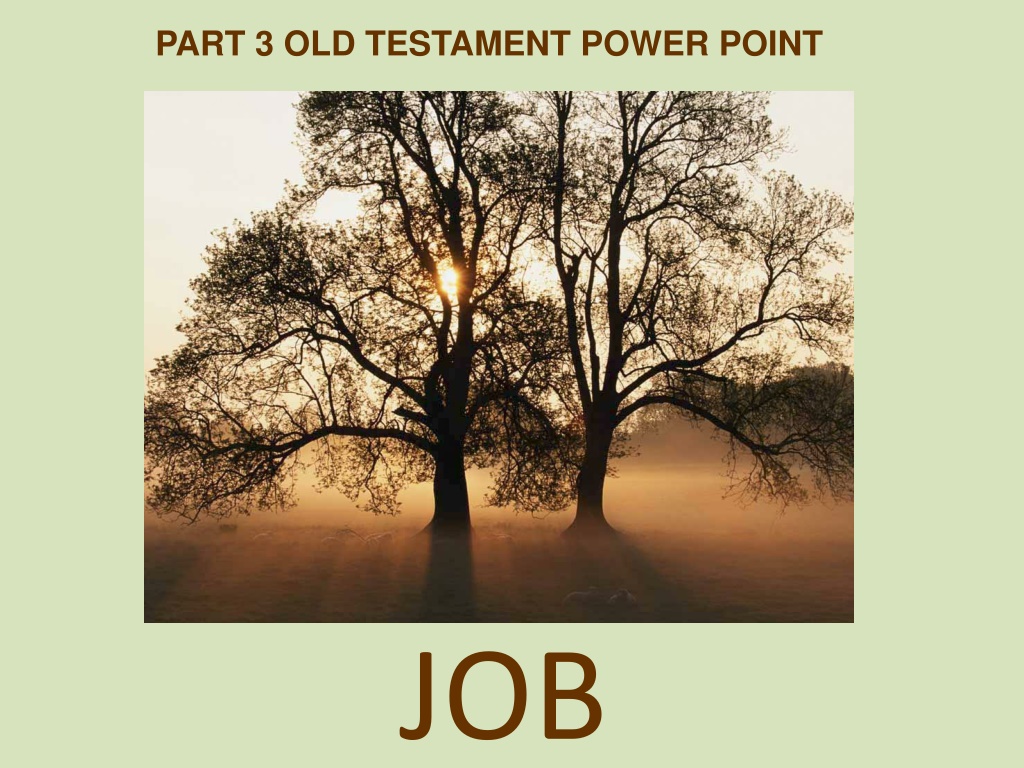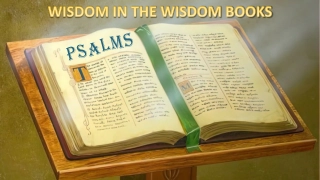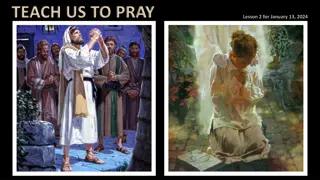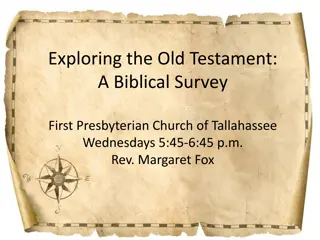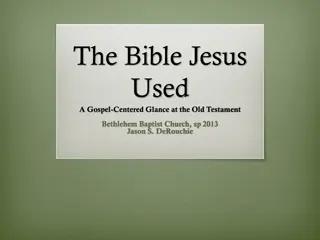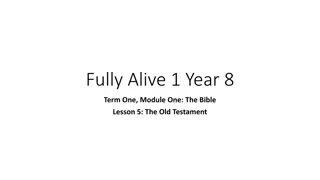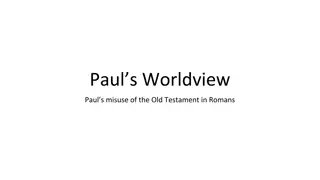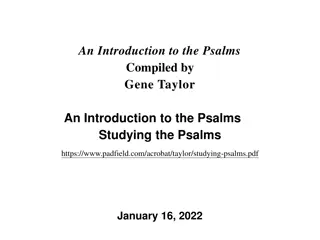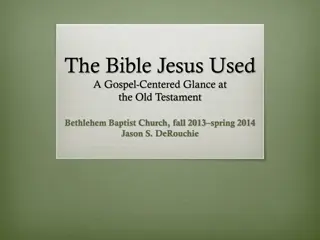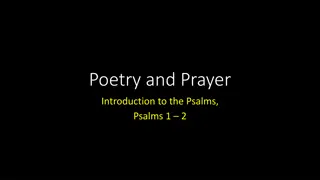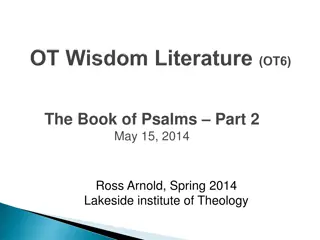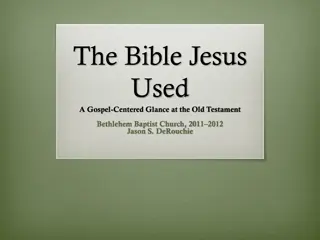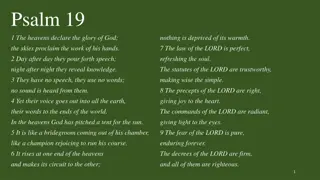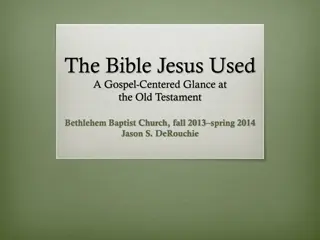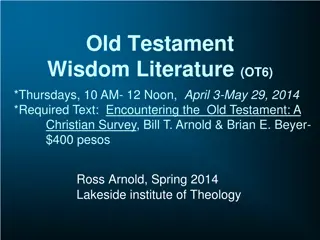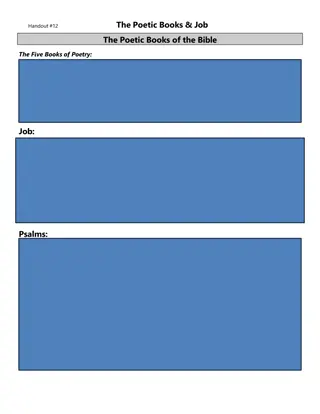Understanding the Themes of Job and Psalms in the Old Testament
The books of Job and Psalms delve into profound themes such as the reason for the suffering of the righteous, the sovereignty of God, and the significance of prayer and praise. Job grapples with the problem of pain, shifting from wrongful assumptions to a deeper understanding of God's divine nature. In contrast, Psalms, authored by various individuals including David and Solomon, serves as a collection of poetic expressions capturing everyday experiences, prophecies, and instructions on worship and prayer. Both books offer insights into faith, righteousness, and the believer's relationship with God.
Uploaded on Sep 26, 2024 | 0 Views
Download Presentation

Please find below an Image/Link to download the presentation.
The content on the website is provided AS IS for your information and personal use only. It may not be sold, licensed, or shared on other websites without obtaining consent from the author. Download presentation by click this link. If you encounter any issues during the download, it is possible that the publisher has removed the file from their server.
E N D
Presentation Transcript
JOB AUTHOR: uncertain possibly Job. RECIPIENTS: not stated. DATE: probably about the time of suffering of the righteous. THEMES: Why do the righteous suffer? Sovereignty of God
How Job handles the problem of pain. 1. THE PROBLEM: Why righteous suffer while the wicked prosper. 2. Wrong Answer: (of Job s three friends): Suffering is God s judgment for sin. 3. ANSWER OF ELIHU: Suffering is God s way to teach discipline, and it refines. 4. GOD S PERFECT ANSWER: Suffering is a test of trusting God for who He is, NOT for WHAT He does.
Job replies to the Lord 1. He now knows that God is all-powerful and sovereign (v. 2). 2. He agrees with God that he has spoken without knowledge and thus negated wise counsel (v. 3; cp. 38:2) 3. He is now ready to receive God s counsel for he now has a better understanding of who God is (vv. 4-5). 4. Therefore he despises himself and repents (v. 6).
PSALMS Greek transliteration of stringed instrument.
PSALMS AUTHORS: 100 out of 150 have the author s name inscribed: David (73) Sons of Korah (10) Solomon (2) Heman (1) Moses (1) Asaph (12) Ethan (1)
RECIPIENTS: 1. The Lord 2. The righteous 3. Israel 4. All mankind in general DATE: From Moses (1440 BC) Babylonian captivity (580 BC)
PURPOSE: 1. Show experiences of everyday life 2. Show experiences of the wicked 3. How to worship 4. Prophecy 5. Teach us to pray 6. Teach us how to sing 7. Prophecies concerning Christ Messianic Psalms
THEME The believer communing with his God through prayer and praise.
NAME Hebrew title: Tehillim praise songs Greek Septuagint: Psalmoi songs to the accompaniment of stringed instruments English: Psalms stringed instrument
PSALMS OUTLINE PSALMS OUTLINE Each book ends with a doxology of praise. Book I (1-41) Largely prayers of David. Book II (42-72) General subject: Sufferings of the godly and their deliverance. Book III (73-89) God s dealings with Israel from the beginning of the Nation to the final blessing.
Book IV (90-106) Gods peoples sufferings and afflictions will end with the Lord s reign. Book V (107-150) These emphasize the Word of God and picture the Messiah both suffering and coming in glory.
TYPES OF PSALMS 1. Didactic 2. History 3. Hallelujah 4. Penitential 5. Supplication 6. Thanksgiving 7. Messianic 8. Nature 9. Pilgrim 10.Imprecatory
TYPES OF PSALMS Didactic(e.g., Psalms 1, 5, 7, 15, 17, 50, 73, 94, 101) psalms of formal instruction. History(e.g., Psalms 78, 105, 106, 136). Almost wholly composed of references to historical events of the nation of Israel.
Hallelujah (e.g., Psalms 111-113, 115-117, 135, 146-150). Theme of praise in these psalms is obvious. Penitential (e.g., Psalms 6, 32, 38, 51, 102, 130, 143). Confession of sin occupies the greater part of each of these. Psalm 51 is the classic example of this type of psalm.
Supplication (e.g., Psalm 86). The psalmist cries to God in his own need, or he intercedes for another s need. Thanksgiving (e.g., Psalms 16, 18). The note of praise and thanksgiving pervades the whole book of Psalms, but some individual psalms are particularly thanksgiving psalms.
Messianic (e.g., Psalms 2, 20-24, 41, 68, 110, 118). They prophesy of Christ in His two advents: His first advent in humiliation, and His second advent in glory. Nature (e.g., Psalms 8, 19, 29, 33, 65, 104). God s handiwork is an inspiring subject for any poetical writing.
Pilgrim (e.g., Psalms 120-134). Each bearing the title Songs of Degrees, was probably a hymnbook used by the Jews on their pilgrimage up to the Temple on the occasions of the national feasts.
Imprecatory (e.g., Psalms 35, 52, 58, 59, 69, 83, 109, 137, 139, 140). The imprecatory (cursing) passages of these psalms are generally looked upon with a great deal of perplexity. Many cannot understand how such utterances could be acceptable to God.
HAPPINESS WHERE IT ISN T The counsel of the ungodly. WHERE IT IS The way of sinners. I FOUND IT The seat of the scornful. IN THE LAW OF THE LORD!!!
DAVID CALLS GOD 7 NAMES In Psalm 18 his Strength his Rock his Fortress his Deliverer his Shield his Horn his High Tower
God speaks thru His Works BY HIS WORD
GODS WORD -- DESCRIBED DESCRIPTION RESULT 1. Perfect Restores the soul 2. Sure Makes the simple wise 3. Right Rejoicing the heart 4. Pure Enlightening the eyes 5. Clean Enduring forever 6. True Desirable 7. Righteous Sweet
SOMETHING TO SING ABOUT GOD FORGIVES Transgressions Sin Iniquities Deceit A New Joy A New Life A New Song AND HE GIVES
GODS WAY TOUGH BUT NECESSARY Trust and Do Commit and Trust Delight and Desire Rest and Wait DON T FRET CEASE FROM ANGER DEPART FROM EVIL FOR THESE
investigate your depressions Be honest with yourself. Bring the Lord into the situation. Discover the reason. Renounce self pity. Commit it to the Lord. Hope and trust in God.
STRESS God has the CURE PSALM 46 v. 10 v. 10 v. 1, 2 v. 8 v. 11 Be Still Know God Respond Review Relate cartoon_doctor_CoolClips_cart0413 stress
TRUE REPENTANCE involves: CONFESSION OF SIN A PLEA FOR A CHANGED LIFE
TRUE REPENTANCE involves: TRUE GODLY SACRIFICE Apostle Paul in Prison - Rembrandt Van Rijn Bartyhomepage Would you visit nursing home patients? Would you go to jail for Christ?
PSALM 77 SOLUTION TO DEPRESSION Depression (vv. 1-6) Doubts (vv. 7-10) Remembrance (vv. 11-20) The Psalmist s depression is caused by doubts. The solution to his doubts comes as he meditates on God s past dealings which have ALWAYS been faithful.
PSALM 119 Terms Used for the Word of God Law (instruction or revelation) Testimonies (or precepts) Ways Precepts (or order) Statutes (or decrees) Commandments Judgments (or ordinances) Word Path Word (meaning promises)
PSALM 119 THE WORD AFFECTS: The Mind (v. 169) The Mouth (vv. 171, 172) The Will (v. 173) The Emotions (v. 174) The Conscience (v. 176)
PROVERBS WISDOM FOR LIVING
PROVERBS Author: Most of the book by Solomon. Recipients:Presumably Rehoboam (writer s son) 1:8-2:1. Date: Started around 950 BC, not finished until around 725 BC. Purpose: To apply divine wisdom to various aspects of daily life. (1:1-5) Theme: Wisdom for living. Title:Hebrew term proverb comparison. Any sage or moralistic pronouncement.
Proverbs Compared W/Other OT Books BOOKS Books of The Law Books of The Prophets Job KEYNOTES Revelation & Guidance Authority USES Manual of History & Legislation Message for today & tomorrow Answers from God & Man Handbook of Devotion Guide to Practical Living Questionings & Reasonings Worship Psalms Proverbs Observation & Reflection
TOPICS IN PROVERBS 1. Adulteress 2. Anger 3. Correcting (instructing others) 4. Compromise 5. Discipline from the Lord and from parents 6. Drinking 7. Evil company 8. Fools 9. Friends 10.Fear 11.Fear of the Lord 12.Giving (money) 13.Heart 14.Correcting (advising) 15.Discipline 16.Gossip 17.God 18.Guidance 19.Laziness 20.Justice
TOPICS IN PROVERBS (contd) 21.Jesting 22.Knowledge 23.Love 24.Married Life 25.Men (righteous) 26.Men (wicked) 27.The Mouth 28.Obedience to parents 29.Peace 30.Pride & humility 31.Relationships 32.Riches (money) 33.Satisfaction 34.Stealing 35.Temptation 36.Testing 37.Trust 38.Vows 39.Wisdom (the wise) 40.Worship
Proverbs 1:7 Fear of the Lord = a reverence for God expressed in submission to His will. Ryrie
The way of sinners is attractive but it leads to destruction. Ryrie
Throughout Proverbs chapter one through nine wisdom is often personified and offers direct counsel to Solomon s son (see 3:13-18; 4:6, 13; 8:1- (fully personified in 9:13-18). 36; 9:1-12)
1. We will discern righteousness and justice 2. We will be delivered from evil (12-15). 3. We will be delivered from adultery 4. We will walk in the good way (20-22). discern righteousness justice (9-11). be delivered from evil be delivered from adultery (18-19). walk in the good way
3:18 Wisdom as the source of life is a common theme throughout the book (3:22; 4:13, 22-23; 8:35; 9:6; 10:11; 11:30; 12:28; 13:12; 14:27; 15:4; 19:16, 23).
Pride Lying Murder A wicked heart Evilness False witness Sowing discord
These proverbs are general principles and guidelines which may have exceptions. Any exception is not a problem of inerrancy, but a matter of the nature of proverbs. They are true as general rules. Ryrie
PROVERBS 14 v. 12 Although a way may seem right to a man, it may end in death (see 12:15; 16:25; 21:2). PROVERBS 22 v. 6 train up a child (see 22:15; 23:13). v. 24 do not associate with a hot- tempered man.
PROVERBS 31 vv. 10-31 the excellent wife. v. 30 the greatest possible characteristic for a woman is that she fears the Lord.
14:17 14:29 15:1 15:18 16:32 19:11 19:19 20:22 22:24, 25 27:4 29:11 29:22
14:17 Anger leads to foolish actions (cf 14:29). The quick- tempered person acts foolishly and loses people s respect. 14:29 Results from lack of patience and understanding. 15:1- A harsh word stirs up anger 15:18 Anger stirs up dissension hot-tempered strong word meaning heat, rage.
16:32 Patience is preferable to physical power (patience = Longsuffering; slow to anger). This person has his emotions under control. 19:11 Discretion makes a man slow to anger. It is glorious to overlook an insult. 19:19 The hot-tempered person will be constantly in trouble.
20:22 Rather than take our own revenge we should wait on the Lord. The Lord here is our deliverer rather than avenger. 22:24, 25 Avoid associating with a hot-tempered man because his influence could prove fatal. 27:4 Jealousy is more unbearable than anger.
